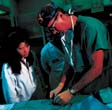 Stopping
cancer in its tracks "The normal function of urokinase is to break down blood clots, but it's over-expressed in cancer cells," he explains. "It facilitates a cancer cell's ability to invade surrounding tissue." Indeed, physicians use a synthetic version of urokinase, which is produced by the kidneys and excreted in urine, to treat heart attacks and stroke. It's part of a family of drugs that includes another popular protease, tissue plasminogen activator (t-PA), also used to treat heart attacks and stroke. But in prostate cancer and some other cancers, urokinase plays a different role. "Cancer cells and blood vessel cells both make urokinase. The cancer sends signals that tell the blood vessels to make more urokinase, which helps them pave the way for new vessel growth." Researchers have identified which protein signals are responsible and are now sorting out how these signals are transmitted through the blood vessel cells to turn on the urokinase gene, Evans adds.
Home |
Table of Contents |
To our Readers |
Building on Basics UC Davis Health System | © 2000, 2001, 2002 UC Regents. All rights reserved. |
Evans splits his time between the operating room, where he is a urologic oncology surgeon, and the research lab. |

